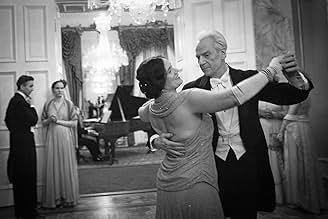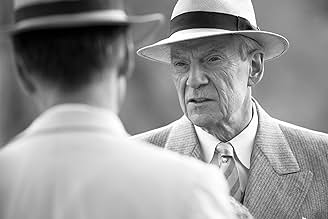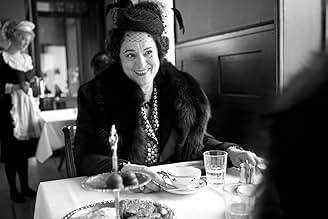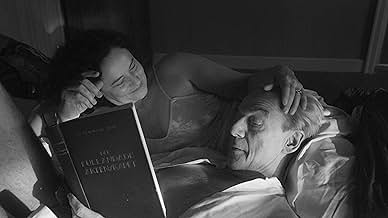Agrega una trama en tu idiomaA story based on the life of journalist Torgny Segerstedt, who alerted the Swedish public to the threat of Fascism in the 1930s.A story based on the life of journalist Torgny Segerstedt, who alerted the Swedish public to the threat of Fascism in the 1930s.A story based on the life of journalist Torgny Segerstedt, who alerted the Swedish public to the threat of Fascism in the 1930s.
- Dirección
- Guionistas
- Elenco
- Premios
- 3 premios ganados y 7 nominaciones en total
- Dirección
- Guionistas
- Todo el elenco y el equipo
- Producción, taquilla y más en IMDbPro
Opiniones destacadas
7vsks
It was troubling to view Swedish director Jan Troell's 2012 film based on the experience of crusading journalist Torgny Segerstedt, so soon after the recent tragic assassinations at Charlie Hebdo in Paris. Segerstedt was editor-in-chief of one of Sweden's leading newspapers, and between 1933 when Hitler came to power and his own death in 1945, Segerstedt was a fierce opponent of Naziism, even though much of Sweden's leadership, including the king, was determined to remain neutral and out of the war. The struggle for journalists' right—some would say duty—to speak out despite risks to themselves and others has not ended. Beautifully played by Jesper Christensen, Segerstedt left himself open to criticism and to the devaluing of his motivations by his long affair with a Jewish woman, wife of his publisher. Hollywood's crusading journalists are noble and flawless (think All the President's Men), their presumed moral authority overshadowing any rough spots in their personalities, whereas Segerstedt's uncompromising character is pompous at times and unpleasant at others, he basks in his celebrity, and he's downright cruel to his wife. "Easy to admire, but very hard to like," said RogerEbert.com reviewer Glenn Kenny. Truth told, he loves his dogs best. Producing this film in black and white may have symbolic significance or may be just the preferred Scandinavian style—the film is Swedish, after all. In another Bergman-like touch, Segerstedt sees and converses with the black-clad ghosts of his mother and other women. Slow-moving, like the clear stream (of words?) against which the opening and closing credits appear, there is only a fleeting soundtrack to support the action. The film left me with a lot of unanswered questions. What happened with his writing? When the authorities demanded that a particular edition not be distributed because of its anti-Nazi editorial (which suggests they had imposed some censorship regime), Segerstedt printed it with a big white space where the editorial would have been. Nice. But we never learn whether he was allowed to continue writing after that (or how he was stopped) until a scene that takes place years later. How did the war affect the Swedish people? There's little hint of that, beyond putting up blackout curtains. It seems they had electricity, they had food, petrol, champagne at New Year's. It's primarily the awareness of Nazi behavior that the viewer brings to the film that explains and justifies both Segerstedt's simmering outrage and his country's policy of appeasement. He and his mistress both have suicide plans, if it came to that, but in the absence of any tangible, on-screen threat, their preparations seem self-dramatizing and almost childish. Segerstedt in a sense provides his own epitaph, which is also the Swedish title of the movie—"Judgment on the Dead"— based on a line from a famous Old Norse poem, which says the judgment on the dead is everlasting. History's judgment on Segerstedt would be that he was of course right about the Nazis. And if, as the King believed, it would have been his fault if the Germans invaded the country, he would have been among the first to die. NPR's Ella Taylor called the film "A richly detailed portrait of a great man riddled with flaws and undone by adulation."
Personal courage becomes a scarce commodity when the times get tough. And there weren't times much tougher than 1930's and the rise of Nazism. Europe stood paralyzed in an unlikely marriage of fear and denial. Veteran director Jan Troell tells a story of a public figure that bravely attacked Nazis in his newspaper column. Torgny Segerstedt was revered and much suspected. His principals made the others look corrupt and petty. And they were, but that is beside the point, because nobody has more concern about appearances than the immoral and tainted. The interesting quirk of this brilliant movie is that Torgny himself was a deeply flawed human being, in turns neglectful and cruel to his wife and kids. Somehow this man with such strong sense of morals, cared about the humanity in general, but alas, not for individuals. Well, that might be understandable. The messiness of humanity would try the patience off all saints combined. Our times prove that beyond any doubt.
Jesper Christensen with his Danish accent isn't very credible in his role as the Swedish newspaperman Torgny Segerstedt, famous for his uncompromising anti-Nazi stance. And could Jan Troell be any more boring director? Instead of making a movie about a man who stould up for liberty and against nazism to a great cost for himself, the director Troell just zeros in on his personal life and mistresses.
Borrowed from a library, this movie was first watched by a friend. Because I had picked the movie because of its theme, I was, hence, tentative. The friend found the movie long and made too complicated with its English subtitles and 'ghosts'. However, this is a friend who cannot sit and watch a movie... has to get up and 'do other things' in 'the boring sections'. Does not work with subtitles.
So, I began to watch it with some apprehension. Which swiftly disappeared. Perhaps because I am an activist/dissident in Canada (and I use such movies to ask myself and others, what makes us so naive about our failed democracies when we have stories like this in our history?), it was the subtitles of the dialogue that struck so true. And, being male, (my friend is female) I could relate with the man's inner turmoil. Making the ghosts of three important women in the main character's life becomes an effective tool for exposing this man's conscience. It is also good to follow up the movie with the extras provided with the DVD.
This is a movie I would buy for my collection of 'movies for reflection' on human behaviour that becomes sad ignorance of situations like this... where governments push down the truth. Sweden might use the excuse that they had to do what they had to do to suppress this man and his defence of freedom of speech. This movie simply emphasizes that we have no excuse.
So, I began to watch it with some apprehension. Which swiftly disappeared. Perhaps because I am an activist/dissident in Canada (and I use such movies to ask myself and others, what makes us so naive about our failed democracies when we have stories like this in our history?), it was the subtitles of the dialogue that struck so true. And, being male, (my friend is female) I could relate with the man's inner turmoil. Making the ghosts of three important women in the main character's life becomes an effective tool for exposing this man's conscience. It is also good to follow up the movie with the extras provided with the DVD.
This is a movie I would buy for my collection of 'movies for reflection' on human behaviour that becomes sad ignorance of situations like this... where governments push down the truth. Sweden might use the excuse that they had to do what they had to do to suppress this man and his defence of freedom of speech. This movie simply emphasizes that we have no excuse.
Saw it at Busan International Film Festival(BIFF), and it was the most disappointing film of the weekend.
In fact Torgny Segerstedt's story, in which an anti-Nazi journalist became a political martyr, is quite fascinating. His relationships with women are also intriguing drama material. In addition to those good ingredients, the director Jan Troell had one more ambition: making this film as a journey to the mind of Mr. Segerstedt, rather than a bland and harmless biography. What could go wrong?
First of all, making a black and white period piece with digital cameras(Arri Alexa) was not a good idea; especially when you start your film with real archive films filled with gritty film grains. The images here lack any depth of field, resulting in images which are crisp and dull at the same time. The whole feature felt like a cheap TV reenactment of the actual events, rather than an artistic reinterpretation.
The script is not good as well. Without some fantasy elements based on a Bergman tradition, the whole feature consists of a series of important events in the protagonist's life. The timing is always off; things just come and go without proper investments. Most of all, even though it is based on the real events during World War 2, there is no sense of dread or grief.
Even though Jesper Christensen's performance was stellar, I cannot recommend this film. It is a film made with good intentions, but fails to live up to them.
4/10
In fact Torgny Segerstedt's story, in which an anti-Nazi journalist became a political martyr, is quite fascinating. His relationships with women are also intriguing drama material. In addition to those good ingredients, the director Jan Troell had one more ambition: making this film as a journey to the mind of Mr. Segerstedt, rather than a bland and harmless biography. What could go wrong?
First of all, making a black and white period piece with digital cameras(Arri Alexa) was not a good idea; especially when you start your film with real archive films filled with gritty film grains. The images here lack any depth of field, resulting in images which are crisp and dull at the same time. The whole feature felt like a cheap TV reenactment of the actual events, rather than an artistic reinterpretation.
The script is not good as well. Without some fantasy elements based on a Bergman tradition, the whole feature consists of a series of important events in the protagonist's life. The timing is always off; things just come and go without proper investments. Most of all, even though it is based on the real events during World War 2, there is no sense of dread or grief.
Even though Jesper Christensen's performance was stellar, I cannot recommend this film. It is a film made with good intentions, but fails to live up to them.
4/10
¿Sabías que…?
- TriviaThis is the second movie in which Jesper Christensen and Pernilla August are parts in a wife-husband-mistress triangle. Here Pernilla August is the mistress, in Drabet (2005) she was the wife.
- ErroresIn the movie at a party which is supposed to take place 1938 the swedish song "Hur har du det med kärleken idag?" is played and also sung by the character Maja Forssman. This song is from 1945 and was then made popular by the famous swedish artist Ulla Billquist.
- Bandas sonorasFinlandia
Written by Jean Sibelius
Selecciones populares
Inicia sesión para calificar y agrega a la lista de videos para obtener recomendaciones personalizadas
Detalles
- Fecha de lanzamiento
- Países de origen
- Idiomas
- También se conoce como
- The Last Sentence
- Locaciones de filmación
- Productoras
- Ver más créditos de la compañía en IMDbPro
Taquilla
- Total en EE. UU. y Canadá
- USD 62,506
- Fin de semana de estreno en EE. UU. y Canadá
- USD 9,020
- 22 jun 2014
- Total a nivel mundial
- USD 328,005
- Tiempo de ejecución2 horas 6 minutos
- Color
- Relación de aspecto
- 1.78 : 1
Contribuir a esta página
Sugiere una edición o agrega el contenido que falta































